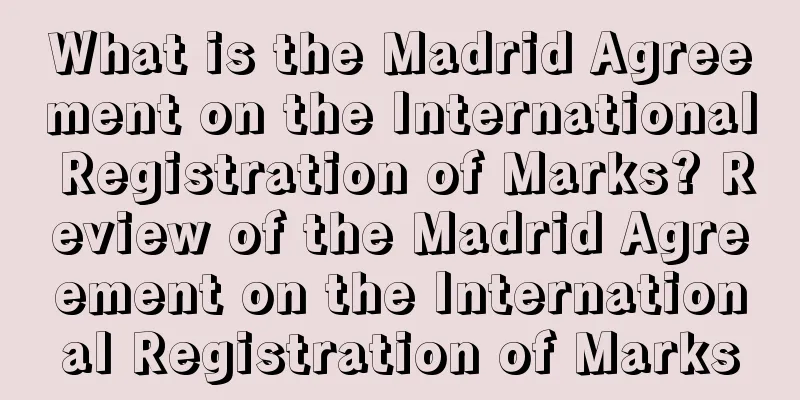What is the Madrid Agreement on the International Registration of Marks? Review of the Madrid Agreement on the International Registration of Marks

|
The Madrid Agreement Concerning the International Registration of Marks is an international treaty used to regulate and standardize international trademark registration. Signed on April 14, 1891 Full name Madrid Agreement Concerning the International Registration of Marks Signed in Madrid Madrid International Trademark Registration refers to the trademark registration conducted among the member states of the Madrid Union in accordance with the provisions of the Madrid Agreement Concerning the International Registration of Marks (hereinafter referred to as the "Madrid Agreement") or the Protocol Relating to the Madrid Agreement Concerning the International Registration of Marks (hereinafter referred to as the "Madrid Protocol"). The international trademark registration usually refers to the Madrid International Trademark Registration. The "Madrid Union" refers to the special union for international trademark registration composed of countries or intergovernmental organizations to which the "Madrid Agreement" and the "Madrid Protocol" apply. background The Madrid Agreement Concerning the International Registration of Marks (hereinafter referred to as the Madrid Agreement) was signed in 1891. It is an international treaty used to regulate and standardize international trademark registration. The Madrid System for International Registration of Marks was born. The Protocol Relating to the Madrid Agreement Concerning the International Registration of Marks (hereinafter referred to as the Madrid Protocol), adopted at the Madrid Union Assembly in 1989, supplements and improves the agreement, making the Madrid System more flexible and operational. The Protocol came into force on December 1, 1995. The Madrid Agreement and the Madrid Protocol together constitute the legal framework of the Madrid System, which is currently managed by the World Intellectual Property Organization, with French, English and Spanish as the working languages. The Special Union for the International Registration of Marks composed of countries or intergovernmental organizations to which the Madrid Agreement and the Madrid Protocol apply is called the "Madrid Union". As of 2021, the Madrid Union has a total of 108 contracting parties, covering 124 countries. my country joined the Madrid Agreement in 1989 and became a member of the Madrid Union; in 1995, it joined the Madrid Protocol and became one of the first contracting parties. Major economies in the world, including the United States, the European Union, Germany, France, the United Kingdom, Italy, Japan, South Korea, Russia, Australia, and Switzerland, are also members of the Madrid Union. Before the birth of the Madrid System, if a country wanted to register its trademark in another country, it could only register in a single country. The Madrid System has established a working model of a trademark registration transit station: if an applicant of a contracting party wants to apply for a trademark in another contracting party, he can directly submit an application to the domestic trademark authority based on the domestic registered trademark to extend the rights of the trademark to other contracting parties for protection. The member country where the applicant is located is the country of origin, and the trademark authority of the country of origin is the origin office. The domestic registered trademark is called the basic registration, and the application is called the territorial extension application. After the origin office conducts a written examination and a formal examination of the application, it submits the registration application to the executive body of the Madrid System, that is, the International Bureau of the World Intellectual Property Organization. After charging a certain fee (basic registration fee), the International Bureau conducts a formal examination of the application, registers the application in the International Registration Book, and issues the applicant an "International Registration Certificate" at the same time, indicating that the International Bureau has received and registered the application, and then transfers the application to one or more member countries or regions designated by the applicant, that is, the designated contracting parties. Finally, the designated contracting party conducts a substantive examination to decide whether the trademark can be registered in that country or region. Contents of the Agreement [Text omitted] References
|
<<: What is Amazon Home Services? Amazon Home Services Review
>>: What is Amazon Global Payments? Amazon Global Payments Review
Recommend
Thanksgiving 2021 US online sales reached $5.1 billion! The lowest expected value!
<span data-shimo-docs="[[20,"获悉,近日,根据Adobe...
What is Google Shopping? Google Shopping Review
Google Shopping is a price comparison product unde...
Shopify launches new plug-in to integrate with TikTok Shop sales
It is learned that recently, Shopify launched a Ti...
What is Buy Shipping? Buy Shipping Review
Buy Shipping is an online delivery service on Amaz...
What is Tictail? Tictail Review
Tictail is an online e-commerce store platform fou...
Many sellers’ accounts have been suspended! The reason is that Amazon has adjusted this function...
Amazon recently changed its appeals process for t...
I've never seen this before! Spittoons are sold for $61 on Amazon! It turns out that so many Chinese products are popular overseas
<span data-shimo-docs="[[20,"选品作为爆单的第一环,也是...
What is Easypaisa? Easypaisa Review
Easypaisa is known as the Pakistani version of Ali...
What is Benniao Social? Benniao Social Review
Benniao Social (Shenzhen Benniao Social Technology...
The lower the ACOS of Amazon advertising, the more it affects product sales!
ACOS is an important factor in measuring the succe...
Ad exposure increased by 20,000, advanced matching type keyword delivery method
Today I will share with you how to increase ad exp...
What is Lay-Buy? Lay-Buy Review
Lay-Buy is a delayed, affordable payment method fo...
A sign of a new round of crackdowns! Amazon's new policy hits sellers hard, forcing them to "do charity"?
▶ Video account attention cross-border navigation ...
Sellers beware! Amazon has recently seen a large number of these emails!
Recently, a new method of email phishing scam has...
What is Kingsons? Kingsons Review
Kingsons was founded in 1997, mainly engaged in ba...









